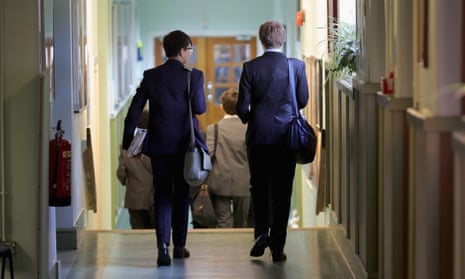“Middle-class families protest at their exclusion from grammar schools.” Not your usual headline, but news nonetheless of a petition signed by thousands of parents objecting to a plan by Birmingham’s six grammar schools to boost the number of poorer children gaining entry. The parents say they are concerned at the possible dilution of high academic standards, but not far beneath is a clear worry that changes to admissions will mean fewer places for middle-class kids.
The situation reveals just how fraught the politics of entry to selective schools has become. Theresa May’s ill-judged decision to expand grammar schools is possibly her sole flagship domestic reform. Yet only a tiny number of poorer children gain entry to these schools: nationally, grammars accept only 3% of children on free school meals, and families in the Birmingham area pay up to £5,000 to coach their primary-age children for the 11-plus test.
So, at a time of increasing crisis in classroom budgets, the government has had little choice but to make the admission of a few more children from less affluent families a condition of extra funding for selective schools. Earlier this month, 16 grammars were awarded extra cash in return for proposals to increase the number of places for poorer pupils.
The paucity of these proposals should have been the real story. Instead, we’ve witnessed a powerful backlash from those parents who assume a shot at a place at one of those schools to be their right. More broadly, they reflect the attitudes of a swathe of affluent families across the country, who have long seen the country’s 163 grammar schools as their rightful preserve.
Yet the petitioners are walking a tightrope. There’s some unattractive social snobbery in their suggestion that allowing in more local children, as a result of a marginal drop in the pass mark, risks diluting previously high standards. Nor does it look good to appear to oppose educational opportunity for poorer kids.
But perhaps the most telling aspect of the whole affair is the publicity the petition has attracted. In this story, as with most coverage of selective education, rarely do we hear from the largest group of all: those who never had a hope in hell of a grammar school in the first place. When was the last time you heard a parent talking on Radio 4’s Today programme about how their child failed the 11-plus, perhaps on grounds of family circumstance or chronic poverty, and was sent to an under-resourced nearby school with few high-attaining children?
Where are the petitions from the hundreds of thousands of families whose members have been belittled by a socially discriminatory school system, thus passing down the generations limited opportunities and a lack of self belief?
The evidence is overwhelming: grammar schools perpetuate a two-tier system that dangerously constrains the educational progress, confidence and life chances of the vast majority of poorer children.
Only well-resourced comprehensive education, with high-quality schools in every area, can provide the best mix of excellence and equity. Tinkering with admissions in a fundamentally flawed system clearly solves nothing and, as the Birmingham petition conclusively shows, ends up pleasing no one.
Melissa Benn is a founder of the Local Schools Network. Her latest book is Life Lessons: The Case for a National Education Service

